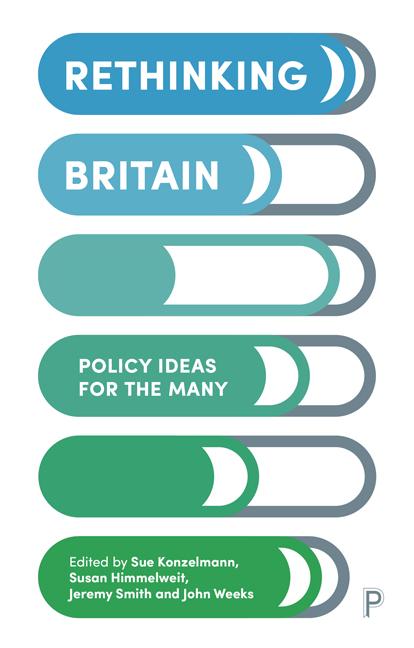Book contents
- Frontmatter
- Contents
- List of Tables and Figures
- The Contributors
- Foreword
- Introduction
- Interlude: ‘Mirror, Mirror, On the Wall – Who has the Highest Debt of All?’
- Part One Building a Full-Employment Economy: Introduction
- Part Two Public Investment – Prioritising Society Rather than Profit: Introduction
- Part Three Making Finance Work for Society: Introduction
- Part Four Genuine Social Security: Introduction
- Part Five How to provide for Social Needs: Introduction
- Conclusion
- Jargon Busters
- References and Further Reading
- Index
Part One - Building a Full-Employment Economy: Introduction
Published online by Cambridge University Press: 11 March 2021
- Frontmatter
- Contents
- List of Tables and Figures
- The Contributors
- Foreword
- Introduction
- Interlude: ‘Mirror, Mirror, On the Wall – Who has the Highest Debt of All?’
- Part One Building a Full-Employment Economy: Introduction
- Part Two Public Investment – Prioritising Society Rather than Profit: Introduction
- Part Three Making Finance Work for Society: Introduction
- Part Four Genuine Social Security: Introduction
- Part Five How to provide for Social Needs: Introduction
- Conclusion
- Jargon Busters
- References and Further Reading
- Index
Summary
There is a general acceptance of myths about government finances and economic management that comes from a lack of understanding of public spending and taxation. Lack of understanding turns into misunderstanding under the assault of propaganda, and provides fertile soil for converting myth into accepted wisdom. Knowledge provides the mechanism to dispel these myths, to reveal accepted wisdom as myth.
Informed citizens are the foundation of democratic society. By participating through democratic institutions citizens facilitate effective government, and understanding government finances is central to that participation. In both Europe and the US few public issues are as consistently misrepresented as how governments should manage the economy, and this facilitates policies that undermine rather than enhance public welfare. To defend special interests governments can use these misrepresentations to justify policies that weaken the ability of the public to participate as citizens.
Many of us hesitate from engaging in a discussion of government budgets because of an imagined lack of expertise in what are perceived as complex subjects – because ‘I am not an economist’ or ‘economics is too dull and difficult to try to understand’. Public sector economic management is about politics as well as economics, yet many politicians and much of the media discuss government economic policies as if constrained by economic imperatives. Those imperatives themselves are frequently treated as natural forces beyond the control of governments and citizens. Debates over political priorities are too frequently treated as if they were a technical matter for an expert elite.
This first part of this book takes the reader past surface rhetoric for a straightforward discussion of government economic management, ‘fiscal policy’ (public spending, taxation and the balance between the two), monetary policy and the Bank of England, and the functional role of public deficits and the public debt. Understanding the nine ‘policy ideas’ in this part of the book requires no prior knowledge of economics, only an inquiring and open mind.
The ideas that follow all challenge the prevailing orthodoxy on economic management and the role of the public sector. Mainstream ideology on economic management preaches that the main task of policy-makers is to balance the public budget and keep inflation low. That combination will allegedly stabilise the overall economy, automatically ensuring full utilisation of resources and employment for all.
- Type
- Chapter
- Information
- Rethinking BritainPolicy Ideas for the Many, pp. 9 - 12Publisher: Bristol University PressPrint publication year: 2019



